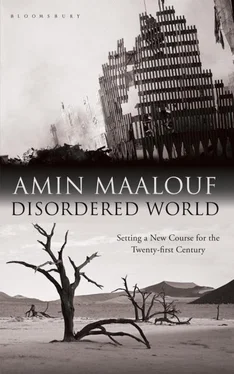Of course, no one can know all they would like or ought to know about others. There are so many peoples, cultures, languages, and visual, musical, choreographic, theatrical, artisanal and culinary traditions. But if everyone were encouraged to become passionate from childhood and remain so throughout their life about a culture other than their own, for a language freely chosen through personal affinity — and if they studied it more intensively even than they studied the indispensable English language — the result would be a closely woven cultural web covering the whole planet, encouraging threatened identities, reducing hatred, gradually reinforcing belief in the unity of the human adventure and as a result making possible the step change that might save us.
I can see no more crucial objective for this century and it is clear that, in order to achieve it, we must give culture and education the prime place which is their due.
In the US and elsewhere, a sinister era in which it was thought good form to despise culture and to make a lack of culture a proof of authenticity may be coming to an end. This populist attitude paradoxically has something in common with elitism, since both accept that the general public have limited capacities, that you must not make too great intellectual demands of them, that it is enough to give them full shopping trolleys, simplistic slogans and facile amusements in order for them to remain blissfully happy, docile and grateful.
This attitude is contemptuous of democracy and therefore dangerous. Because it is not possible to be fully a citizen or a responsible voter if you passively allow yourself to be manipulated by propagandists, or to be stirred up or calmed down according to the whim of your leaders, or let yourself be docilely led into war. In order to make properly informed decisions, especially in a country whose direction largely determines the fate of the planet, a citizen needs to know the world around him in depth and in detail. To make do with ignorance is a denial of democracy and reduces it to a sham.
For all of these reasons and some others, I believe that our scale of values today can only be based on the primacy of culture and education. And that the twenty-first century — to echo the quotation I cited earlier — will be saved by culture or it will not be at all.
My conviction is not based on any pre-existing doctrine, just on my reading of the events of my time. But I am not insensitive to the fact that the great religious traditions with which I come into contact contain similar exhortations. ‘The ink of the sage is worth more than the blood of the martyr,’ said the Prophet of Islam. He is also reported as saying: ‘The sages are the heirs of the Prophet’; ‘Seek knowledge, even in China if you must’; and, ‘Study from the cradle to the grave!’
In the Talmud, there is this strong, moving idea: ‘The world is only supported by the breath of children studying.’
The struggle to ‘support the world’ will be hard, but the deluge is not a foregone conclusion. The future is not written in advance; it is up to us to write it, to conceive and build it — and build it with boldness, because we must dare to break with centuries-old habits; with generosity of spirit, because we must assemble, reassure, listen, include and share; above all with wisdom. This is the task which is incumbent on all of us, men and women of all origins; there is no choice but to take it on.
When a country is plunged into chaos, emigration is always an option. When the whole planet is threatened, we cannot go and live elsewhere. If we do not wish to resign ourselves to decline, for ourselves and the generations to come, we must try to influence the outcome of things.
Will it be possible in the years ahead to construct a new form of solidarity among people which goes beyond all borders — one that is universal, complex, subtle, thoughtful and adult? One that is independent of religion without in any way being anti-religious or insensitive to people’s spiritual needs, which are as real as their physical ones? A solidarity that can transcend nations, communities, ethnicities, without abolishing the abundance of cultures? Which is able to bring people together in the face of the dangers that threaten them, without indulging in apocalyptic rhetoric?
In other words, will we see the emergence in the course of this century of a new, mobilising form of humanism which will not be hostage to any tradition, nor fall into the errors of Marxism, nor appear as the political or ideological tool of the West? For the moment I can see no sign of it. What I do detect is the extraordinary mobilising force of hereditary allegiances which accompany humans from cradle to grave; which they sometimes lose but almost always end up regaining as though they had constantly been held on the end of an invisible leash; which cross the centuries, adapting somehow or other to the changing world, but without ever losing their hold. And conversely I also see the fragile, transitory, superficial character of the forms of solidarity which try to transcend these allegiances.
When Marx referred to religion as the ‘opium of the people’, he did not do so with mockery or disdain as his disciples often did. It is perhaps useful to quote the phrase in context: ‘Religion is the sigh of the oppressed creature, the heart of a heartless world, and the soul of soulless conditions. It is the opium of the people.’ From his point of view, this ‘illusory happiness’ had to be abolished so that people would work to build genuine happiness. From this one might reasonably deduce with hindsight that if the promised happiness turned out to be yet more illusory, people would return to their consoling opium.
Consequently, it seems to me that if Marx had been able to witness this resurgence of religion in the political and social spheres, it would have pained him but not really surprised him.
Political Islamism prevailed in Arab and Muslim societies at the expense of nationalism and Marxism, but it was not content to defeat these doctrines; it assimilated and appropriated them.
The most eloquent example of this was the Iranian revolution of 1979 — a religious event certainly, but also a nationalist, anti-monarchist, anti-Western, anti-Israeli one, launched in the name of the impoverished masses. It was a heady brew which exerted a determining influence on the whole Muslim world.
Some Muslim leaders had already attempted to weave together the three strands — national, religious and social. Among them was President Sukarno of Indonesia, who declared the principle of ‘Nasacom’, an acronym in the local language for nationalism–religion–communism. But all it amounted to was an artificial amalgam which quickly came unstuck.
Even when communism was replaced by socialism, to avoid too obvious a contradiction with Islam, the combination did not work. Nowhere in the Muslim world did nationalism succeed in assimilating religion the way that religion would assimilate nationalism. When the Turks and the Arabs, after four centuries of coexistence in the Ottoman empire, went their separate ways during the First World War, each of them developing their own brand of nationalism, they were both unmarked by the Islam that united them — in Turkey this was radical under Atatürk’s aegis, out of a desire to set a new course, while in the Arab world it was less clear cut, but in the rhetoric, the phrase ‘Muslim nation’ was discreetly but systematically replaced by ‘the Arab nation’. Their respective styles were very different, but the basic assumption was the same: nationalism, which was a new idea, could not use religion as a crutch without losing out.
Of course, ambiguities have always existed. In the eyes of the masses, Nasser was always a hero of Islam. But he avoided making explicit reference to religion, and was careful not to justify his political actions with quotations from the Qur’an because he knew that would mean entering territory where his political enemies, the Muslim Brotherhood, had the upper hand. He never boasted of being a religious president, as his successor Sadat did. Sadat was much less prudent in this regard. In order to free himself from the grip of the Nasserists and tackle the progress made by the left, he sought the support of the Islamists and tried to appropriate their language. But he could not handle the forces he had unleashed for long before they turned on him ferociously.
Читать дальше












